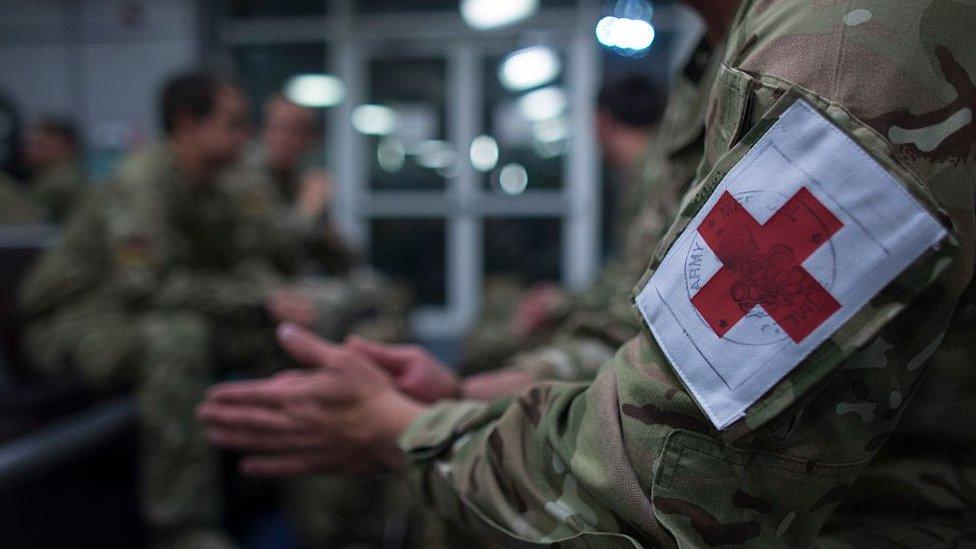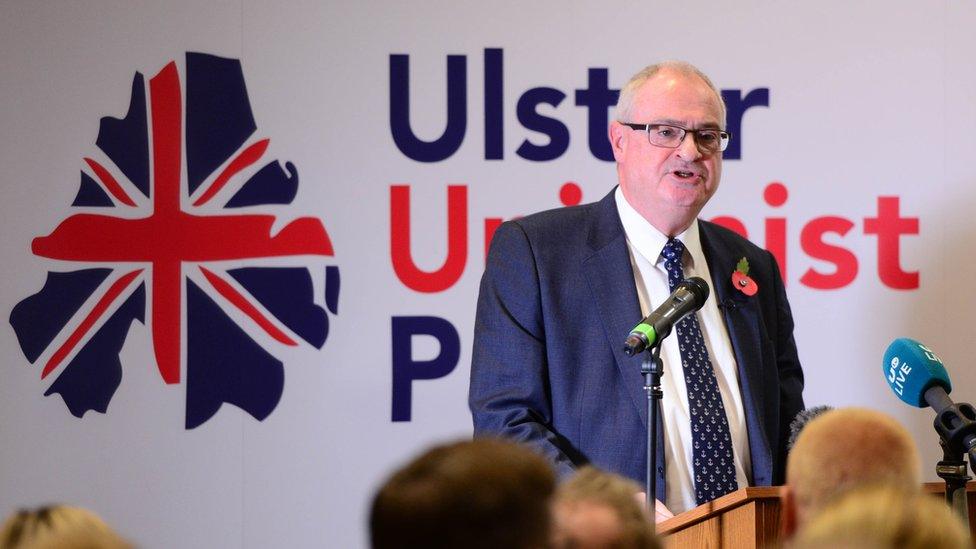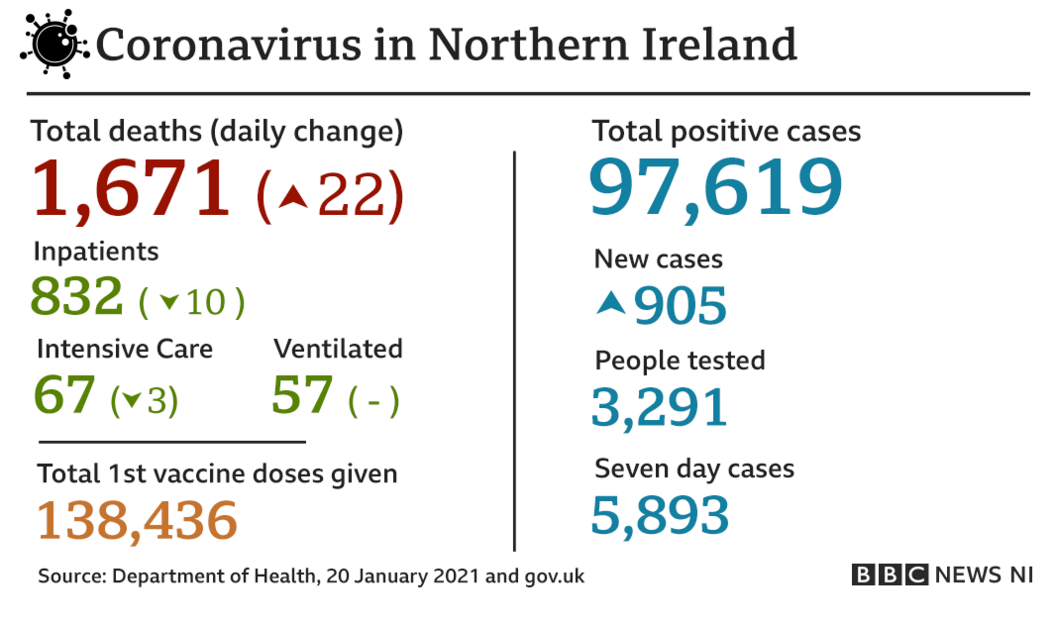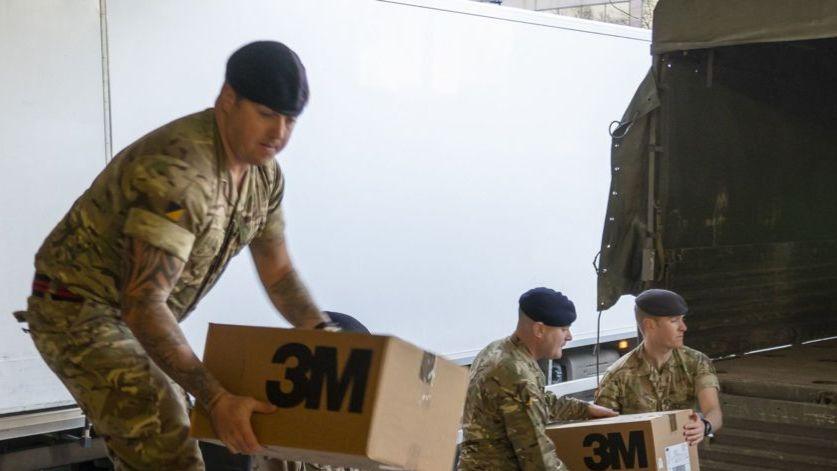Covid-19: Unison 'not opposed' to military help
- Published

More than 100 medically-trained military personnel will be deployed
NI's largest healthcare union has said it has not objected to military personnel being brought in to help medical staff deal with Covid-19.
However, Unison said it had questions over the move and there had "disappointingly" been no consultation.
An initial statement from the union on the subject was criticised by some politicians.
Ulster Unionist leader Steve Aiken described it as "appallingly inappropriate".
A new statement issued on social media, from the union's regional secretary Patricia McKeown, said the first statement had been "misunderstood".
Speaking to Good Morning Ulster, she acknowledged the initial statement had caused "stress and hurt" to Unison members and apologised for that.
Health Minister Robin Swann has asked the Ministry of Defence (MoD) to help out, primarily at a number of hospitals across NI.
More than 100 medically-trained military personnel will be deployed.
Military deployment 'a last resort'
In the union's initial statement, issued on Wednesday,, external it said it would ask Mr Swann for "detailed reasons" for the move.
It said this would include "seeking information as to what other avenues of support have been sought, such as securing additional staffing from private sector healthcare providers".
However, following criticism, Ms McKeown said in a new statement on Thursday morning that the union was "happy to clarify" its position.
"To be absolutely clear, Unison has not objected to assistance from military personnel."
She added: "In our experience the deployment of military personnel into public services is a decision taken as a last resort.
"We were immediately concerned that a request for aid of this nature indicates a crisis that is moving out of control.
"This is why it is important that we know in advance what options are being explored."
The union said it was important to get detailed information on how, when and where external personnel would be deployed and what the management and accountability structures will be in place for them.

Steve Aiken described the first Unison statement as appallingly inappropriate
Speaking on Radio Ulster's Good Morning Ulster on Thursday, Ms McKeown said: "We put a statement out last night, it said what we were going to do, but it didn't say why we were going to do it.
"That caused stress and hurt to our members and I am very, very sorry for that. That's why we corrected it."
She added that if military personnel were being brought in "it means that all options have been exhausted, there's a big decision facing us now and that decision is a stronger lockdown".
The earlier statement from the union, issued on Wednesday night, had been criticised by some politicians.
Ulster Unionist leader Steve Aiken said: "Judging by the number of healthcare workers who have contacted me tonight they are absolutely incredulous at the Unison statement this evening.
"Getting help is what is needed - time for Unison to withdraw its appallingly inappropriate remarks."
DUP assembly member Jonathan Buckley said: "This statement from Unison is extremely disappointing and is out of step with both Unison's own members and the wider public.
"I have already been contacted by health service staff making clear that this does not represent their views."
His party colleague Paul Frew tweeted, external: "Utterly appalling. A lot of anger tonight for a union that is supposed to support its membership."

Speaking on Good Morning Ulster, West Belfast People Before Profit assembly member Gerry Carroll said: "We all recognise that we're in a really desperate situation, a really difficult situation.
"But people want to see the health service expanded permanently and not just a short-term fix which people have questioned on a number of grounds."
However, Ulster Unionist Doug Beattie said nurses and doctors were exhausted.
"What we're really talking about here is a surge of some personnel in order to support out frontline nurses who are dead on their feet," he said.
"The here and now is about saving lives."
On Wednesday, Sinn Féin responded to Mr Swann's decision by saying it would not "rule out" any measures that help save lives and that "any effort to make the threat posed by Covid-19 into an orange and green issue is divisive and a distraction".
The chief executive of the Belfast Health Trust, Dr Cathy Jack, told Stormont's health committee that the move would ensure staff can continue to deliver care to as many patients as possible.
She said the military personnel are "band 4 medically-trained technicians" who will "be working under normal management structures".
"This is another group of highly-trained individuals that will support staff and I welcome this."
Dr Jack said discussions were "ongoing" about how private health care providers could help in this phase of the pandemic.
She said a small number of private lists were being used for surgeries with low-risk cancers and more would be freed up in March "to allow us to try and catch up on the backlog".
'Intense' challenge provokes military call
The Military Aid to the Civil Authorities (MACA) request means armed forces staff will assist nurses and help on the wards in a move designed to ease the pressure on staff.
It is thought the first military staff will be made available as early as next week.
Mr Swann said the Army has previously carried out pandemic roles in Northern Ireland with "aeromedical evacuation, real-estate and ongoing logistical planning".
The health minister added it would have been an abdication of responsibility if he did not avail of help from the military.
He said while coronavirus cases were lower than two weeks ago, the challenge posed remained "intense" and intensive care pressures were expected to increase further in the next eight to 10 days.
As of Wednesday, there were 832 people in hospital in Northern Ireland with coronavirus, of whom 67 were in intensive care, with 57 ventilated.
A further 22 people with coronavirus died, bringing the Department of Health's total to 1,671 while there were 905 new cases.
Related topics
- Published11 April 2020
